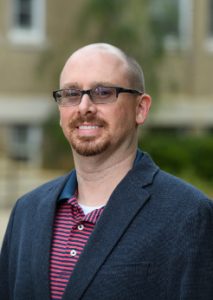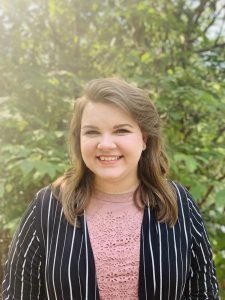By: Margaret Savoie
The Graduate School is lucky to have multiple programs that can give back to the community in different ways. One such mechanism is providing mental health resources to the people in the community.

Dr. Todd Smitherman, professor of psychology and director of clinical training.
The clinical psychology program has two main ways that the community is served. The first is through a campus clinic, called the Psychological Services Center. Here low-cost therapy and assessment services are provided. This is not only for individuals from the campus community but also for those from the broader community, in the county, and even some from out of state.
“We serve children all the way to older adults and a lot of what we do is therapy for things like anxiety disorders, depression, bipolar conditions, substance abuse disorders, and more,” said Dr. Todd Smitherman, professor of psychology and director of clinical training.
“Our program also sends the students out into community placements, like state-run mental health facilities, private practices, and even research-focused hospitals like St. Jude,” said clinical psychology Ph.D. candidate Katelyn Sharpe from Wiggins, Mississippi. The clinical psychology program partners with about 10 different agencies in the community where one or more of the graduate students work and gain hands-on experiences.

Katelyn Sharpe
Graduate students are also able to gain hands-on experience through the Clinic for Outreach and Personal Enrichment (COPE). Here students within the counselor education program work with students, faculty, and staff and other members of the community.
“We are free, and clients do not have to be affiliated with the University – it’s open to anyone,” said Dr. Alex Kerwin, associate professor of counselor education and clinical coordinator at the COPE. For community members to be able to access free mental health services is valuable and not something available everywhere.
Due to COVID-19, the COPE is currently only offering telehealth services.
“Students are able to use our clinic and our HIPPA compliant system to offer telemental health delivery. All a kid needs is an iPad or a laptop, even a cell phone, anything that allows Zoom,” said Dr. Rick Balkin, interim department chair of the Department of Leadership and Counselor Education and professor of counselor education.
The staff at the COPE is made up of about eight counselors, who are all master’s students. These master’s students are then supervised by doctoral students who are licensed counselors.
One of the doctoral students is Kami Tran, from Arkansas.
“I work under a grant that Dr. Balkin received, called the Governor’s Emergency Education Response (GEER) Fund and our program specially provides telehealth to students in Mississippi, and we’ve partnered with three different school districts to provide telehealth resources,” said Tran.

Jeff Pavlacic
Connecting with the community is not only important for student learning, but it sets the University’s programs away from the rest.
“I have particularly enjoyed the ability to pursue avenues that most interest me, rather than follow a cookie-cutter path to graduation,” said Sharpe.
Jeff Pavlacic, a clinical psychology Ph.D. candidate from St. Louis, Missouri, echoed the importance of the program’s distinction. “I chose the University of Mississippi due to the excellent clinical and research opportunities, as well as the opportunity to continue working with patients in rural settings.”
As mentioned, services at the COPE are free and open to anyone in Mississippi at this time. The on-campus Psychological Services Center operates on a sliding scale fee which means that pay for a session is based on income and life situation.
For more information on the COPE please email cope@olemiss.edu or call (662) 915-7197 and for the Psychological Services Center please call (662) 915-7385.

